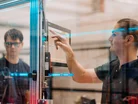Siemens AI Industrial Copilot Adopted by Thyssenkrupp

Siemens has announced that Thyssenkrupp Automation Engineering will be a globally customer of its Industrial Copilot for Operations, the first generative AI-powered assistant ever created for engineering in an industrial environment.
Capable of writing code, providing multimodality and executing agent concepts, the Industrial Copilot is highly value to engineers across the manufacturing industry.
Siemens plans to offer the copilot as an on-premises hardware-software bundle, in order to deliver full data sovereignty and site integration.
The software stack running on IPCs is powered by NVIDIA NIM microservices, part of the NVIDIA AI Enterprise software platform, which gives automation and maintenance engineers the power to ask real-time queries about operational and document data to facilitate rapid decision-making and reduce machine downtime.
An internet connection isn't needed for this configuration, storing data on local hardware devices to ensure data security and accessibility.
“With Siemens’ domain expertise, we’re turning generative AI into industrial-grade solutions that can be deployed without specialised AI expertise," says Rainer Brehm, CEO Factory Automation at Siemens.
"The Siemens Industrial Copilot, the first generative AI-powered product for automation engineering, is a supercharger for industrial automation and will accelerate our customer’s journey toward greater innovation, productivity and competitiveness.”
Thyssenkrupp: Bringing generative AI to the shopfloor
Siemens is a strong believer that making generative AI industrial-grade and bringing it to the shopfloor will be instrumental in helping manufacturers improve productivity and overcome industrial challenges.
This aligns with a recent Gartner report, which highlights by 2028 75% of developers will use generative AI on a regular basis to assist with code creation, a massive increase from less than 10% in early 2023.
Thyssenkrupp Automation Engineering is one such manufacturer that's increased it's use of generative AI for engineering. A specialist machine and plant builder, the manufacturer integrated Siemens's Copilot for Engineering in a battery machine used for battery quality inspections on electric cars. Thyssenkrupp engineers have also been using the Industrial Copilot to create TIA Portal projects.
It helps them develop structured control language (SCL) code faster for programmable logic controllers (PLCs), intelligently integrates the code into the TIA Portal and generating a machine visualisation in WinCC Unified.
This enables their engineering teams to reduce repetitive and monotonous tasks like automating data management and sensor configuration, driving innovation, optimising processes and overall working more efficiently.
Thyssenkrupp plans to use the generative AI powered assistant at scale, to engineer the machines at all its global locations from 2025 onwards.
“Thyssenkrupp Automation Engineering and Siemens have been successfully working together for a long time,” adds Dr. Rolf-Günther Nieberding, CEO of thyssenkrupp Automation Engineering.
“I expect that rolling out the Siemens Industrial Copilot across our machines will help us – and therefore our customers – to implement demanding projects in a much shorter time.”
Siemens first implemented the Copilot for Operations in its own factories, specifically its Electronics Factory in Erlangen, Germany across its soldering machines.
The Industrial Copilot helps Siemens operators and maintenance engineers better understand a machine's error codes through natural language translation. Solutions are presented based on the machine's history and details, as the AI combs through a myriad of different spare part lists, manuals and documents.
This ultimately reduces machine downtime, makes shift handovers more efficient and resolves production bottlenecks faster.
Multimodality, agent concepts and on-premises approach to supercharge the Siemens Industrial Copilot
Siemens has also developed an expanded suite of features for the copilot, a fact which helped them win Thyssenkrupp Automation Engineering as a customer.
These new features include the Industrial Copilot's multimodal capabilities to analyse and interpret images and its agent-based automation designed for a variety of tasks.
These features come in addition to its ability to enable shopfloor manufacturing workers to directly interact with machines and do error handling and maintenance tasks significantly faster.
The Engineering Copilot has been available on the Siemens Xcelerator marketplace since July 2024.
While Siemens provides the automation elements of the Industrial Copilot, the natural language processing is carried out by one of the most powerful GPT models that uses the Azure OpenAI Service of the Microsoft Cloud.
Together, utilising software solutions from Microsoft and NVIDIA, Siemens has created a reliable, secure and trustworthy suite of generative AI solutions that provide true value to shopfloor workers, like those at Thyssenkrupp Automation Engineering.
Make sure you check out the latest edition of Manufacturing Digital and also sign up to our global conference series - Manufacturing & Mobility LIVE
Manufacturing Digital is a BizClik brand


